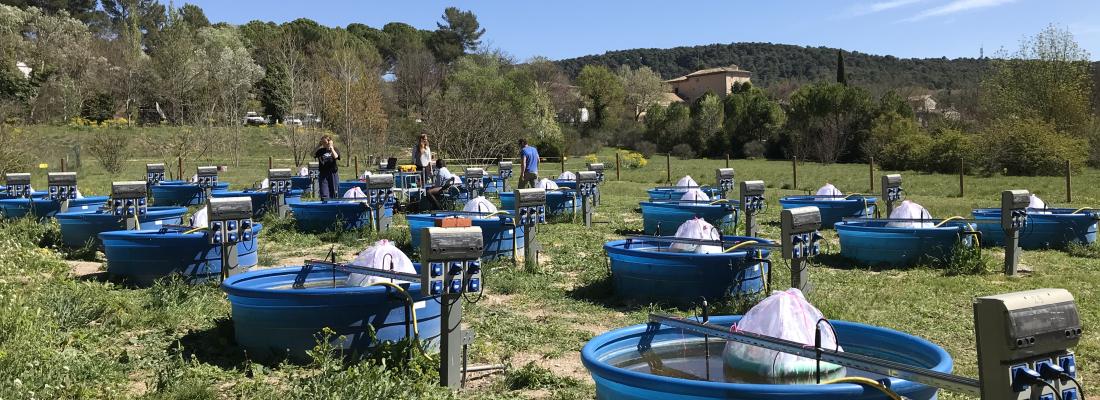Climate change and risks Reading time 5 min
ERC grant to evaluate the thermal limits of lake communities
Published on 03 December 2024

With climate change, ecosystems across the world are under increasing pressure. But how much time do they have left before their thermal limits are exceeded? This race against the climate clock lies at the heart of Arnaud Sentis’s ClimateCountDown research project (5 years, 2 million euros), which seeks to understand how ecosystems will react to ever higher temperatures. Its three key goals are to:
- understand the mechanisms that affect the thermal tolerance of ecological communities;
- predict the time left to these communities before they have completely lost their temperature safety margins, calculated as the difference between the temperature of their current environment and the most extreme temperatures they can tolerate;
- determine whether this countdown approach can predict the impacts of rising temperatures on biodiversity in terms of taxonomy, ecological functions and interactions between species.

The European Research Council programme funds exploratory research based solely on scientific excellence. It enables researchers to identify new fields of research while recognising the status and visibility of Europe’s brightest minds. Above all, the ERC works to develop European research that rises to the challenges of a knowledge-based society and the frontier research needed to address global challenges.
Originality and innovation on many fronts.
Lake ecosystems as warning systems for climate change
At what point will ecosystems cease to have the capacity to adapt to climate change?
The project concentrates on lakes, which respond rapidly to variations in temperature. It will focus on fresh-water species that are particularly vulnerable to climate heating (phytoplankton, including diatoms and cyanobacteria, zooplankton such as daphnia, macro-invertebrates such as crustaceans, insects, molluscs and other worms, and fish).
These ecosystems provide a unique opportunity to study local processes, because the distribution of species in lakes is more constrained than in watercourses or marine environments.
A community-focused approach
ClimateCountDown prioritises a community-focused approach. By linking the physiology of individual species to their ecological communities, it breaks with classic approaches where scientists mainly concentrate on single species, evaluating their thermal vulnerability by comparing the maximum temperature they can tolerate with that of their surrounding habitat. This approach brings major benefits, not least the critical knowledge it will provide on how thermal limits combine with the processes of evolution, acclimatisation and species interactions to shape the climate countdown for communities faced with global temperature rises.
On the practical side, these goals will be achieved by ClimateCountDown by combining data on lake biodiversity, semi-natural experiments and mathematical modelling to study its lake communities.
The big picture
ClimateCountDown is without precedent in the information it will provide on the thermal vulnerability of ecosystems. It aspires to provide scientists, decision-makers and the wider public with a solid framework to predict biodiversity losses and better direct conservation activities. Faced with major climate instability, understanding how ecosystems function and respond to temperature rises will be critical to efforts to safeguard our planet’s natural riches.

Mini-CV
Age: 40
- Professional career
2018-present: INRAE researcher, RECOVER Risks, ECOsystems, Vulnerability, Environment, Resilience Joint Research Unit, Aix-en-Provence
2017-2018: Post-doctoral researcher, SETE Theoretical and Experimental Ecology Station (CNRS, University of Toulouse), Moulis
2015-2017: Post-doctoral researcher, CRBE Centre for Research on Biodiversity and Environment (CNRS, University of Toulouse III-Paul Sabatier, Toulouse INP, IRD), Toulouse
2012-2015: Postdoctoral researcher, University of South Bohemia, České Budějovice (Czech Republic)
- Education
2012: PhD in ecology, University of Montreal and University of Toulouse
2008: Masters in ecology, University of Quebec in Montreal
- Prizes and Awards
2024: Young Researcher Departmental Prize, Bouches-du-Rhône
2015: Young Researcher Award, Société Française d’Ecologie
2011: Excellence Award, University of Montreal
2011: Marie-Victorin Excellence Award, Institut de recherche en biologie végétale, University of Montreal.
